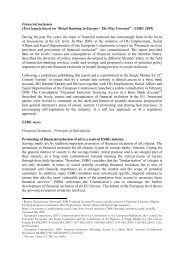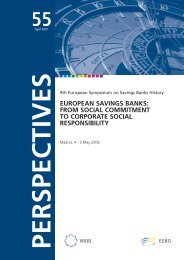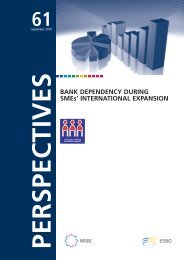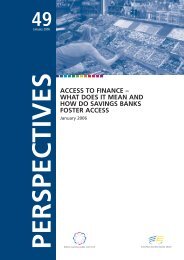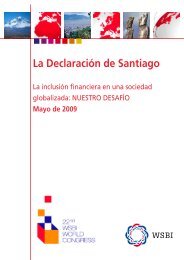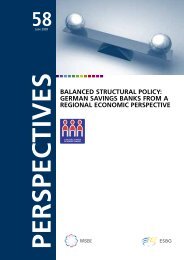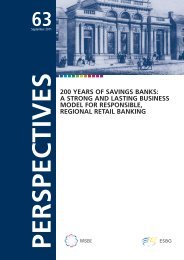A comparative analysis of the US and EU retail banking markets - Wsbi
A comparative analysis of the US and EU retail banking markets - Wsbi
A comparative analysis of the US and EU retail banking markets - Wsbi
You also want an ePaper? Increase the reach of your titles
YUMPU automatically turns print PDFs into web optimized ePapers that Google loves.
Such fears have also been echoed elsewhere, for<br />
instance by <strong>the</strong> European Investment Bank which<br />
recognises that consolidation in national <strong>banking</strong><br />
<strong>markets</strong> may be detrimental to SME lending “since<br />
<strong>the</strong>re is evidence that large banks devote a lesser<br />
proportion <strong>of</strong> <strong>the</strong>ir assets to small business loans<br />
in comparison to small, <strong>of</strong>ten regional, banks” 358 .<br />
The EIB also highlights <strong>the</strong> fear that SME lending<br />
could be impacted by <strong>the</strong> evolution <strong>of</strong> capital<br />
<strong>markets</strong> <strong>and</strong> institutional investors competing with<br />
banks for savings in <strong>the</strong> economy, as <strong>the</strong>y commit<br />
less <strong>of</strong> <strong>the</strong>ir lending to SMEs than banks do 359 .<br />
Anecdotal evidence <strong>of</strong> <strong>the</strong> fear that large commercial<br />
banks in Europe could in fact be cutting down <strong>the</strong>ir<br />
SME lending is highlighted by <strong>the</strong> European<br />
Commission, citing <strong>the</strong> German financial press 360 .<br />
It adds in <strong>the</strong> same paper that “even in those countries<br />
where <strong>the</strong> <strong>banking</strong> sector is characterised by few<br />
banks with limited networks, individual local <strong>banking</strong><br />
relationships remain important [in SME funding].<br />
In <strong>the</strong> UK in 1999, 70% <strong>of</strong> small businesses visited a<br />
branch at least weekly <strong>and</strong> 8% visited daily”.<br />
Given <strong>the</strong> above, <strong>the</strong> existence <strong>of</strong> evidence<br />
indicating that <strong>banking</strong> consolidation is likely to<br />
affect access to <strong>banking</strong> services through branch<br />
rationalisation <strong>and</strong>/or price increases, <strong>and</strong> also <strong>the</strong><br />
quality <strong>of</strong> such services through <strong>the</strong> reduction <strong>of</strong><br />
services <strong>and</strong>/or <strong>the</strong> loss <strong>of</strong> customer relationships 361 ,<br />
is a particular concern with regards to <strong>the</strong> future<br />
funding <strong>of</strong> European SMEs.<br />
The loss <strong>of</strong> <strong>the</strong> customer relationships typical between<br />
SMEs <strong>and</strong> <strong>the</strong> types <strong>of</strong> banks that cater for <strong>the</strong>m, as<br />
described above, has in fact been a significant concern<br />
with regards to SMEs’ access to finance in Europe.<br />
As highlighted above, many SMEs depend, for <strong>the</strong>ir<br />
funding, on a close relationship with a bank, allowing<br />
<strong>the</strong> latter to acquire <strong>the</strong> kind <strong>of</strong> expertise about <strong>the</strong><br />
firm’s credit-worthiness which it would be impossible<br />
or too costly to obtain o<strong>the</strong>rwise. This kind <strong>of</strong><br />
‘relationship lending’ is, according to commentators,<br />
widespread in Europe, especially with SMEs 362 .<br />
The European Central Bank has itself expressed<br />
concern on a decrease <strong>of</strong> <strong>the</strong> availability <strong>of</strong> relationship<br />
lending in Europe. The indicators which it highlights<br />
include a rate <strong>of</strong> growth <strong>of</strong> real loans to <strong>the</strong> private<br />
sector which is below that <strong>of</strong> output growth, a<br />
phenomenon only observed recently. It adds too that<br />
such a decline coincides with large commercial banks<br />
reducing <strong>the</strong> scale <strong>of</strong> <strong>the</strong>ir <strong>retail</strong> <strong>banking</strong> because<br />
competition from local savings banks has intensified.<br />
Fur<strong>the</strong>r, it points to evidence that <strong>the</strong> banks which<br />
have been involved in mergers tend to limit <strong>the</strong> scale<br />
<strong>of</strong> <strong>the</strong>ir relationship lending activities 363 .<br />
The significance <strong>of</strong> <strong>the</strong>se observations are fur<strong>the</strong>r<br />
put into perspective by <strong>the</strong> ECB, who recognises <strong>the</strong><br />
importance <strong>of</strong> relationship lending as a means <strong>of</strong><br />
insulating firms from <strong>the</strong> effects <strong>of</strong> changes in <strong>the</strong><br />
market interest rates, <strong>and</strong> hence contributing to a<br />
smoo<strong>the</strong>r business cycle. It goes as far as to say that<br />
“this may contribute to explain why business cycle<br />
fluctuations have traditionally been larger in <strong>the</strong> <strong>US</strong><br />
<strong>and</strong> <strong>the</strong> UK, where relationship lending is limited, than<br />
in continental Europe, where relationship lending is<br />
thought to be prevalent” 364 .<br />
The extent to which large commercial banks are<br />
retreating from <strong>the</strong> lending business has been<br />
assessed in Germany by <strong>the</strong> German savings banks,<br />
which conducted a research among <strong>the</strong>ir loan <strong>of</strong>ficers<br />
in <strong>the</strong> spring <strong>of</strong> 2001. 60% <strong>of</strong> respondents reported<br />
an unusual increase in dem<strong>and</strong> for new accounts by<br />
SMEs in <strong>the</strong> preceding three months, giving evidence<br />
<strong>of</strong> more than 1,800 requests from SMEs as a<br />
consequence <strong>of</strong> private banks’ withdrawal (through<br />
open refusal or reduced service quality). The research<br />
also revealed that <strong>the</strong> withdrawal <strong>of</strong> commercial<br />
banks is most noticeable in rural or structurally weak<br />
areas, <strong>and</strong> affects especially smaller SMEs 365 .<br />
358 See “SME Finance in Europe: introduction <strong>and</strong> overview”, EIB Papers, volume 8 n°2, 2003.<br />
359 “SME Finance in Europe: introduction <strong>and</strong> overview”, EIB Papers, volume 8 n°2, 2003.<br />
360 “Enterprises’ access to finance”, Commission Staff Working Paper, European Commission, October 2001.<br />
361 “Banking Consolidation in <strong>the</strong> <strong>EU</strong>: Overviews <strong>and</strong> Prospects”, R. Ayadi <strong>and</strong> G. Pujals, CEPS Research Report in Finance <strong>and</strong> Banking No 34, May 2004.<br />
362 See speech by Otmar Issing, Member <strong>of</strong> <strong>the</strong> Executive board <strong>of</strong> <strong>the</strong> European Central Bank, at <strong>the</strong> Second ECB Central Banking Conference “The Transformation<br />
<strong>of</strong> <strong>the</strong> European Financial System”, 24-25 October 2002.<br />
363 See speech by Otmar Issing, Member <strong>of</strong> <strong>the</strong> Executive board <strong>of</strong> <strong>the</strong> European Central Bank, at <strong>the</strong> Second ECB Central Banking Conference “The Transformation<br />
<strong>of</strong> <strong>the</strong> European Financial System”, 24-25 October 2002.<br />
364 See speech by Otmar Issing, Member <strong>of</strong> <strong>the</strong> Executive board <strong>of</strong> <strong>the</strong> European Central Bank, at <strong>the</strong> Second ECB Central Banking Conference “The Transformation<br />
<strong>of</strong> <strong>the</strong> European Financial System”, 24-25 October 2002.<br />
365 “The future <strong>of</strong> European <strong>retail</strong> <strong>banking</strong> <strong>markets</strong>”, ESBG research, June 2003.<br />
127



